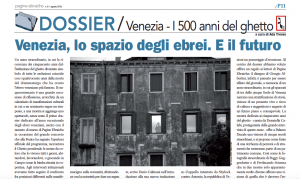MEDIA On Pagine Ebraiche, 500 Years of Venetian history
A remarkable year, an extraordinary coincidence: the 500th anniversary of the formation of the Jewish Ghetto in Venice – still a symbol of all exclusions – and the 400th anniversary of the death of William Shakespeare, the playwright who created the most famous Venetian Jew.
A great opportunity, enriched by a cultural program in which a seminar follows a symposium, an exhibition adds to a show, all year long. In March, Pagine Ebraiche – on the occasion of the concert at the “Fenice” that marked the official opening of the program – was telling the story of the Ghetto taking its cue from those who are there every day, living there, working in the small shops, or playing in the “Campo” as the child portrayed on the cover was doing. Some institutional opinions were followed by a comparison between different ideas on what the Quincentennial should be like, along with the thoughts of many scholars from different fields, to close the pages with the beauty of music.
On the August issue of Pagine Ebraiche, we now go back to Venice with sixteen special pages: there is space to narrate the return of Shylock that, as Shaul Bassi has explained, is a re-appropriation without fear. A stereotype that weighed a ton on the Jewish community, whose fame is now being exploited to give a strong and positive sign of confidence in the future. And Karin Coonrod, the director of the Compagnia de’ Colombari, taking for the first time The Merchant of Venice in the space where it was imagined, dialogues with Frank London, the famous musician and composer who is writing new music for the occasion. The Merchant, as Dario Calimani has written in the introduction to his new translation of Shakespeare’s play, challenges the capability of understanding and the honesty of the performers, a challenge complicated by the history of anti-Semitism. Texts by Susannah Heschel, James Shapiro and Stephen Greenblatt explain what will be debated during the appeal process filed by Shylock against Antonio, the Republic of Venice and also against Portia, accused of having taken the role of the judge while being interested party. An extraordinary mock trial that adds to the representations in the Ghetto, in which the jury chaired by Ruth Bader Ginsburg, Associate Justice of the Supreme Court of the United States will conclude with its deliberations an exceptional afternoon.
The central pages of Pagine Ebraiche are a gift to our readers: a drawing by Giorgio Albertini can be pulled from the newspaper and remain in memory of an extraordinary year: three of the five Scole of Venice show their layers of stories, from the past to a lively present, rich in culture and ideas and to a brilliant future.
The exhibition about the five hundred years of the Ghetto – curated by Donatella Calabi, who is protagonist of Pagine Ebraiche’s big interview, this month – offers in the amazing spaces of Palazzo Ducale a vision of five remarkable centuries, and opens the path to new projects and researches, and some tools, like a map and two apps thaw will remain, as part of a common heritage. The extraordinary portraits of Peggy Guggenheim and the new photographs by Ferdinando Scianna, two different exhibitions, offer a vision of what is the real essence of Venice. At the same time two secret gardens are coming back to life in the Ghetto, and the history of the Hebrew Books is forever intertwined with this magic city, telling a story of culture and traditions that still represent a living heritage. And the year is still long.

